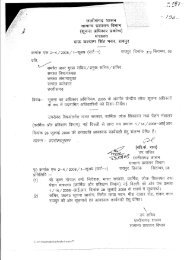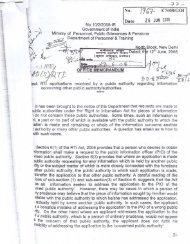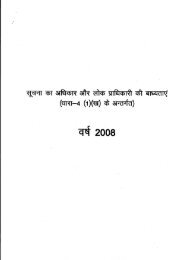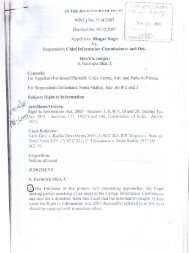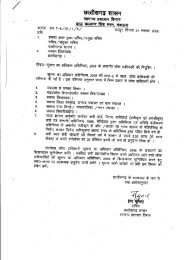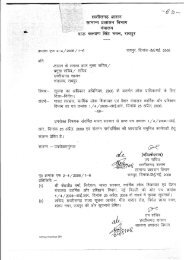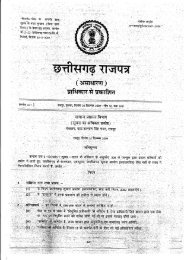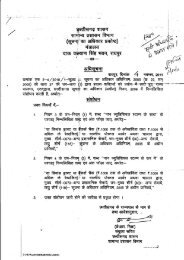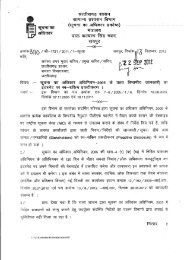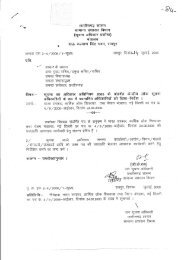sn" - CG State Information Commission
sn" - CG State Information Commission
sn" - CG State Information Commission
You also want an ePaper? Increase the reach of your titles
YUMPU automatically turns print PDFs into web optimized ePapers that Google loves.
--'hz ,J -Officer'shall consider whether the irifomration should be disclosed or not. The guiding p*rciplein such cases is that except in th,e case of trade or commercial spgrets proGcted by la1v,disclosure may be allowed if the public interest in disclosure oUtrriighs in importance ariypossible harm or injury to the interests of such third party. However, the Public lnformation' Offrcer would have to follow the following procedure before disclosing such information.25. lf the Public lniormation Officer intends to disclose the information, he shall within fivedays from.the receipt of the application, give a written notice to the third pafi that the !information has been sought by the applicant under the RTI Act and that he intends to disclosethe information. He shall request the third party to make a submission in writing or orally,regarding whether the information may be disclosed. The third pafi shall be given a time of tendays, from the date of receipt of the notice by him, to make representation against the proposeddisclosure, if any.,..26. The Public lnformation Officer shatt rnake au"i"ion;lparding disclosure of theinformation keeping in view the submission of the third " party. Sucffidecision should be takenwithin forty days from the receipt of the request for information. ;ffibking the decision, thePublic lnformation Officer should give a notice of his decision to the third parg ih writing. The, notice given to the third party st oitd include a statement that the third party is entitted td prefern appeal under section 19 against the decision'27. The thirO party can prefer an appeal to the First Appellate Authority against the decjsionmade by the Public lnformation Officer within thirty days from the date of the receipt of notice. tfnot satisfied withdhe decision of the Finst Appellate Authority, the thircl party can prefer a secondappealto the lnfoimation <strong>Commission</strong>.28. lf an appeal has been filed by the third party against the decision of the Public<strong>Information</strong> Officer to disclose the third party information, the information should ndt Oedisclosed tillthe appeal is decided.SUg Motu Disclosure29. The Act makes it obligatory for every public authority to rnake suo-motu disclosure inrespect of the particulars of its organization, functions, duties and other matters, as provided in, section 4 of the Act. The information so published, according to sub-section (4) of section 4,: ' should'be.easityaccessible with the Public lnformation Officer inelectronic fonn. The Public ,lnformation Officer should, ir,"r"t*", rnii" "on""rt"J "trOrtrto"ntu*in"iin" ruqriiuil"tr;the Section 4 of the RTI Act 2005 are met and maximum information in respect of the public--_-- --- -authority is made available on the interneF lt would h.elp him in two ways. Fiist, the number of*ni!aa;:ana rraiar ri=a r-r*.,.,-,',ai; L^.^;.'*--; nFd Enaa*rtt, l...-..-r: E--il2zt- L:r --.--!- -EgP|/rrw..vrrs gravur -ia.j ^vatrvliau -s asuuvw arrv i'gvvrruty, tt .wcrutu rclultrtcttE; tlro vyvtl\.llilpiace.also lo make complaint to the Gommission. Where the informatlon <strong>Commission</strong> at the time ofdeciding any comptaint or appeal is of the opinion that'the Public lnformation Officer hEs ffthout 'any reasonable cause, refus'ed to receive an application for information or has not furnishedinformation within the time specified or malafidely denied the request for information orknowingily given inconect, incomplete'or misleading infor.mation.or destroyed information whichwas the subject of the request or obstructed in any manner in furnishing the information, it shallimpose a penal$ of two hundred and fifly rupees each day till application iS received orinformation is furnished subject'to the cbndition that lhe total amount of such penalty shall notexceed twenty-five tholrsand rupees. The Public lnformation Officer shall, however, be given areasonable. opportuhity of being heard before any penalty is imposed on him- The burden ofl9



